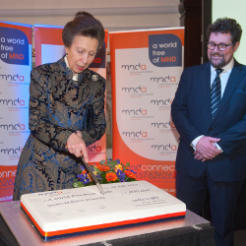The Motor Neurone Disease Association has announced how it will spend over £7m raised through the ice bucket challenge, which went viral on social media last summer.
The charity plans to spend £5m on research projects including a major international study to try to understand the genetic basis of Motor Neurone Disease and will use its DNA bank of blood samples to create stem cells - which will be used to grow human motor neurones that are primed to develop MND.
The MND Association plans to invest in two drug-testing projects and to build its work on an MND register, which should eventually capture information about everyone with MND in England, Wales and Northern Ireland.
The charity made the announcement on Thursday at a celebration event attended by Royal patron of the MND Association, the Princess Royal, and singer Michael Ball.
Speaking at the event Sally Light, the charity’s chief executive, spoke of the success of the “social media phenomenon”.
She said that she was “immensely proud” of how volunteers and staff worked together to “exploit” its “time in the spotlight”.
She went on to say: “The figures generated by all that support are truly astounding. We received just over £7m in donations, from nearly 1 million individual donors, in about 3 weeks.
“We even created a new record on the JustGiving online donation site for the most text donations to a single fundraising page.”
The charity surveyed its members before deciding how it would spend the windfall. Of the 2,000 members that responded, 87 per cent identified research as a priority.
A further £1.5m will be invested in MND Association’s care and support services, which will be used to establish a further two care centres over the next three years, on top of the 19 that the charity already funds.
It will also recruit four specialist MND nurses to provide the “best possible co-ordinated care” and target areas of most need. It is also looking at how it can provide more support for children and young people.
The charity will also spend £750,000 on increasing campaigning and raising awareness on the disease.
A further £1m will be spent on emerging projects and volunteering, and will be used to “take more opportunities to best promote volunteering” through its branches and groups, and get even more people involved in what they do.
The MND Association has committed £8.5m into its new projects, intending to raise the remainder in the coming years.
Light said that one of the lasting legacies of the ice bucket challenge is the impact on those who have MND. She quoted a member of the charity who said: “The ice bucket challenge has given hope to every person touched by this wicked disease because people are now researching MND and finding out the truth.
“Last week I had the conversation with someone about what was wrong with me. Normally this would be half an hour of awkward explanation, but not this time. They knew about MND because of the ice bucket challenge... result!”
Professor Stephen Hawkins CH CBE, who lives with the disease and is a patron of the MND Association, said: “Like many other people around the world I made an ice bucket challenge video with my family last summer.
“I am delighted to hear that so much money was raised for the Motor Neurone Disease Association, and that the majority of this money will be spent on research. I know that life is difficult for so many people living with MND. On behalf of them I thank everyone who took part in the ice bucket challenge; you raised valuable awareness of the disease and vital funds to support the work of MND Association.”









